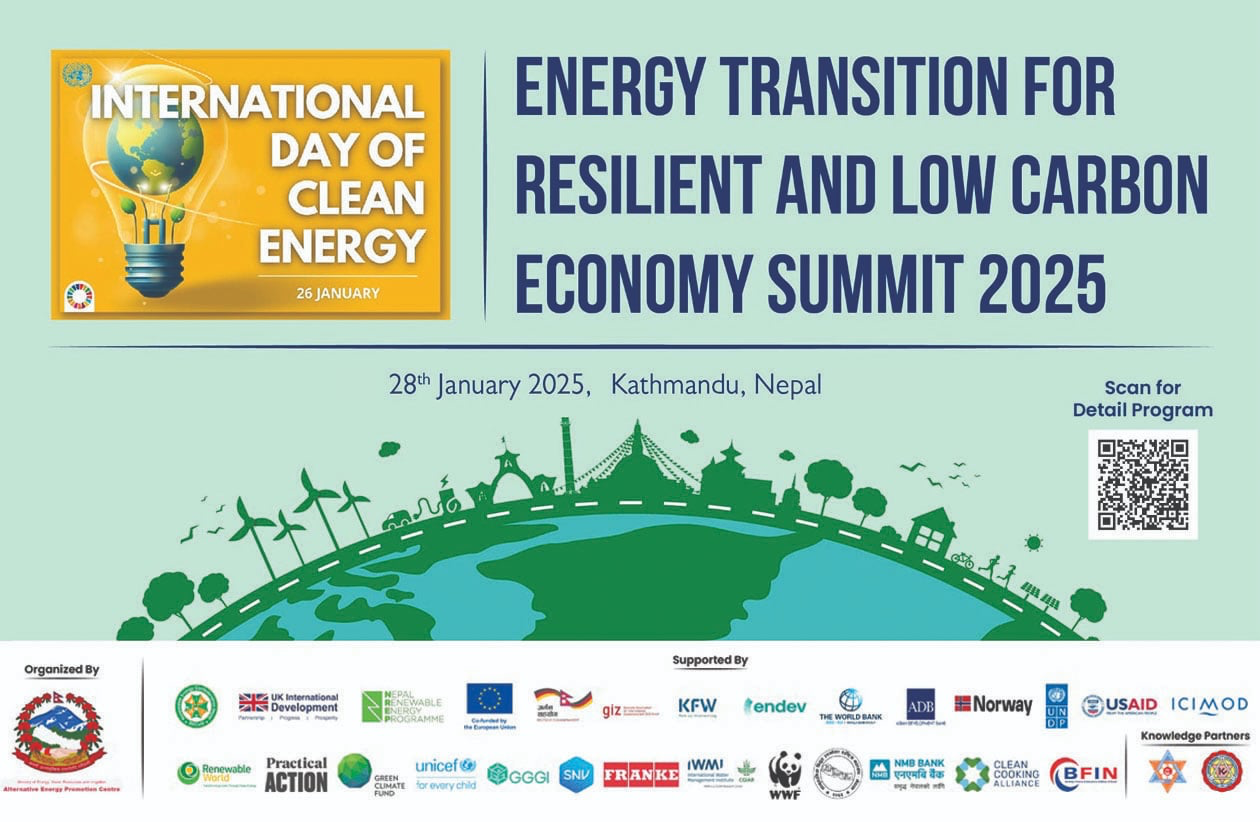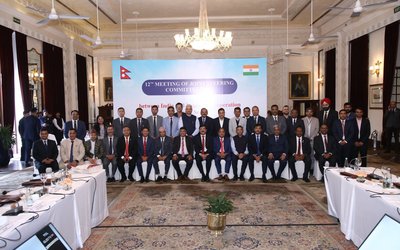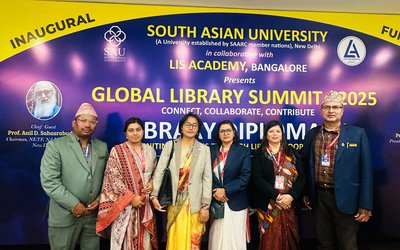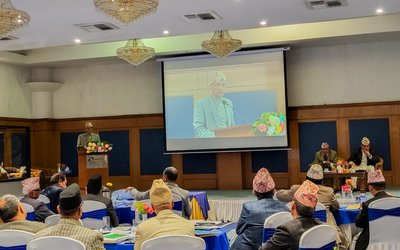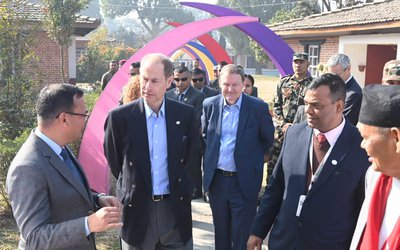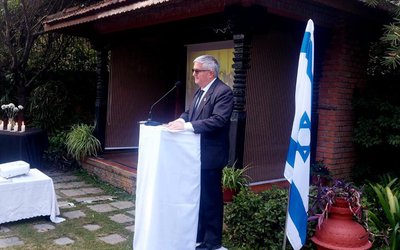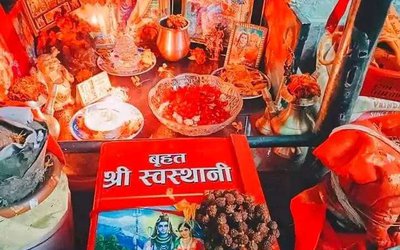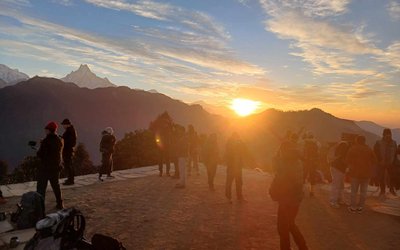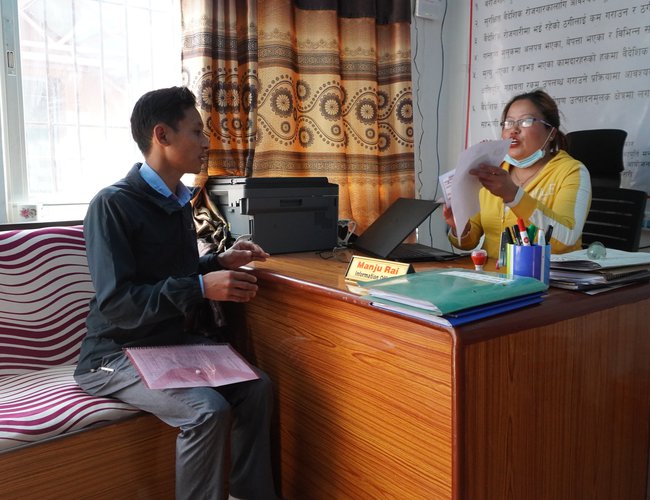
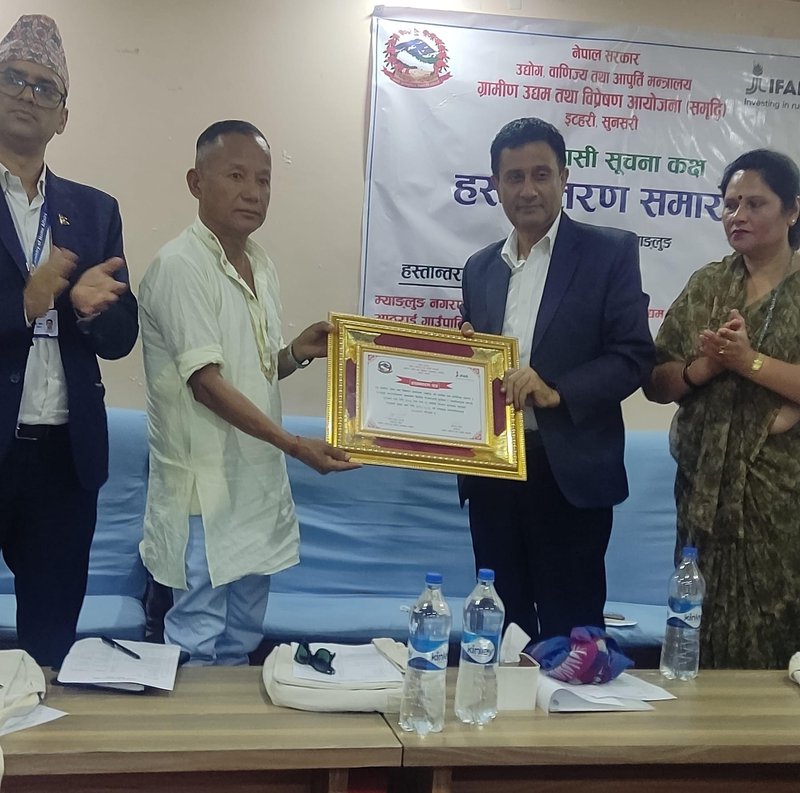
With a significant number of migrants returning home seeking support for reintegration, and a large number of youth leaving the country, Dhankuta Municipality's leadership has faced considerable challenges in managing migration issues without dedicated institutional support.
When the RERP chose Dhankuta as a project area with the aim of establishing an MRC and MID, it was a great relief for Mayor Chintan Tamang. This opportunity felt like a blessing, akin to the Nepali proverb “looking for stone, find a god.” In 2020, Dhankuta Municipality and RERP signed an agreement to implement various projects, including the support for the establishment of an MRC and MID.
Given the high number of migrant families and returnees in the municipality, migration issues are a major concern. The establishment of institutions like the MRC and MID became a priority. Listening to complaints from returnee migrants about fraud and misuse, and addressing the needs of aspiring migrants seeking information about foreign migration laws, rules, and local environments, highlighted the necessity of having dedicated institutions within the municipality.
While various organizations have previously started similar centers, most closed after their respective projects ended. However, the MRCs currently run by the Samriddhi Project in 14 local governments across six districts have demonstrated a different outcome.
Started in 2019, Dhankuta Municipality became the first local government to adopt a migration and reintegration policy and integrate the MRC into municipal governance, ensuring its sustainability. Following Dhankuta's lead, nine other local governments have also approved the MRC policy.
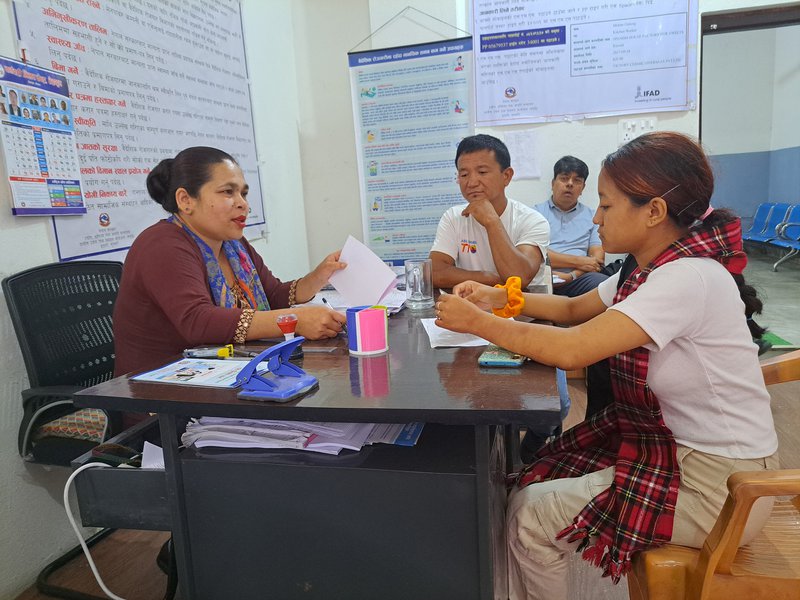
"Along with implementing various other programs, the municipality also established an MRC, now located at the District Administrative Office. The MRC supports migrants comprehensively. Initially, we shared resources with RERP, but for the past year, the municipality has been bearing all the costs. With RERP closing, we have already decided to operate it independently," said Mayor Tamang.
"We had been looking for such a unit for a long time to provide information to new migrants and counseling to returnees for reintegration," Mayor Tamang added. "The center has solved many problems. I can access all kinds of information about migration, and the center alleviates half of our issues. From the start, we contributed to the costs, so we regard this MRC as our own creation."
"Now, the MRC provides services to all seven local governments of Dhankuta district. A working modality for the joint operation of the center has been developed and agreed upon by all local governments. However, Dhankuta Municipality is solely bearing the operating costs. We have recruited two trained and capacitated employees who received training from SAMRIDDHI and the IOM."
"Our centers handle all kinds of complaints filed by migrants, including fraud and misuse of remitted money. With support from the District Administrative Office, the center helps to punish the culprits. The center has established itself as an institution for safe and reliable migration and works very closely with the community."
MRC Activities In Dhankuta
As per Manju Rai, the Information Officer at the Migrant Resource Center (MRC) in Dhankuta, the center was founded in February 2019 and later handed over to the Municipality on May 15, 2023. The center operates with a team of two professionals, comprising an information officer and a counselor.
The center has provided counseling services to 12,672 individuals and has handled 73 cases of disputes, resulting in clients receiving compensation totaling Rs. 231,55,613.00.
Support Services
The center conducts orientation programs for neighboring palikas, community orientations on safe migration, and pre-departure/pre-employment orientations for prospective migrants. Additionally, it organizes orientation programs on MRC services for Social Mobilizers, Palika staff, interaction programs with banks and returnees, and broadcasts Public Service Announcements (PSA) on safe migration through local F.M. Radio.
The center has received a total financial support of Rs. 4,591,850 over the course of four years as co-financing from RERP.
Results and Outcomes
"Through close collaboration with the project, Dhankuta Municipality has officially endorsed the Migration and Reintegration Policy and is currently implementing it. The MRC policy has also been endorsed by the Palika to ensure its sustainable operation," said Jiban Shrestha, Migration Coordinator, RERP-Samriddhi Project.
One significant outcome is that the MRC has been integrated into the permanent structure of Dhankuta Municipality with two time-bound staff members. "MRC has also developed a migration profile of Dhankuta Municipality," Rai stated.
Backed by Mayor Tamang, who is now serving his second term, the MRC and MID have gradually taken a sustainable shape. In a recent program organized to observe International Day of Family Remittance, Mayor Tamang shared his experiences of working on the reintegration of returnee migrants and the successful role of MID and MRC.
"Dhankuta Municipality supports local residents, including returning migrants, by providing Agriculture Grants and Business Grants through various programs in partnership with organizations like RERP and IOM. The support from the SAMRIDDHI project to establish the MRC and MID has been remarkable," said Mayor Tamang.
As RERP aimed for the sustainability of such centers, Dhankuta Municipality is now operating the MRC independently, bearing all operational costs. "The center initially operated on a cost-sharing basis. After the completion of RERP, we have decided to cover all operating costs ourselves," Mayor Tamang explained. "Since migration is a major part of household income in our area, we need this center to provide essential services for our people."
With the Mayor’s initiative, Dhankuta Municipality has also enacted a migration and reintegration policy as advised by RERP. "We have supported 13 other municipalities to establish MRCs and MIDs. Dhankuta Municipality is the first to integrate the center and announce a migration policy in Nepal. Although others are a bit late, they are also beginning to internalize the center," said Saroj Prasad Guragain, Project Manager. "The Ministry will share this learning with other federal ministries, provincial governments, and local governments."
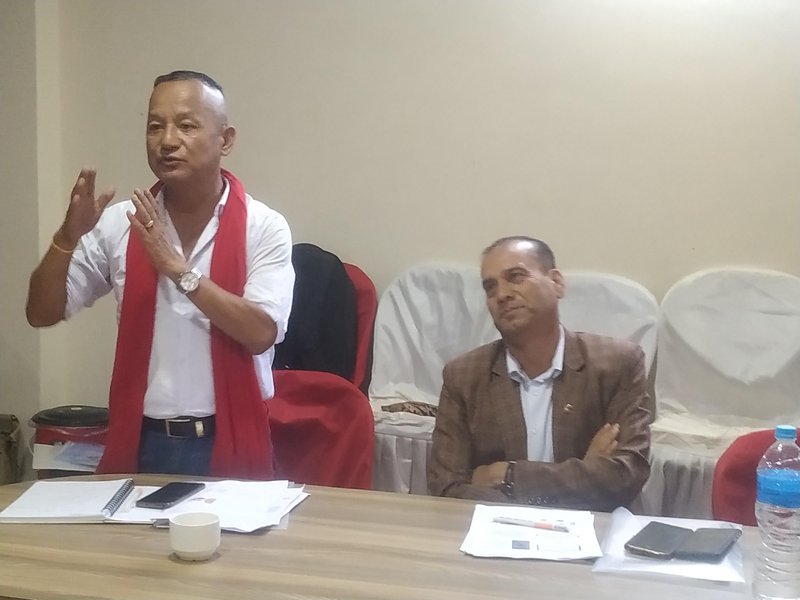
Over the past five years, the Municipality has not only passed necessary bylaws and policies for migration but also expanded the center's services to six other local governments in Dhankuta District.
Although Nepal relies heavily on remittances, with around 400,000 Nepalese leaving and returning annually, mechanisms for providing essential information are still not established nationwide. Without minimum information about destination countries' laws, working conditions, environments, and systems, many Nepalese face bitter experiences when they reach their destinations.
Remittances are critical in Nepal, estimated at US$11 billion in 2023 and accounting for 26.6 percent of the country’s GDP. To sustain migration, accurate information for migrant workers is essential. In this context, RERP-Samriddhi's efforts to establish sustainable MRCs and MIDs at the local level are highly significant.
“There are many experiences from the past. What the project has achieved is the creation of sustainable institutions within local government units and a solid policy framework,” said Sanjeev Kumar Shrestha, National Consultant (Value Chain & Markets) at the International Fund for Agricultural Development (IFAD).
Given the substantial contribution of remittances to the rural economy and households, establishing dedicated institutions like MRCs is highly valuable. These centers provide information for the reintegration of returnees and address issues faced by the poor and vulnerable populations.
Roshan Cooke, IFAD Country Director for Nepal and Bhutan, noted during a program on the International Day of Family Remittances, “In Nepal, it is estimated that remittances make up about 80 percent of smallholder farm households’ income, while only 20 percent of income is earned from agriculture itself.”
MRCs in Nepal
The International Organization for Migration (IOM) established the first MRC to support safe, orderly, and regular migration in Nepal, followed by initiatives from the International Labour Organization (ILO) and Helvetas. However, RERP’s approach is distinct. RERP focused on integrating MRCs with local governments, initially using a cost-sharing approach and later handing over full responsibility to ensure long-term sustainability.
Along with Dhankuta, Myanglung Municipality and Bhojpur Municipality have also begun independently bearing the operating costs of their MRCs. Under the leadership of Mayor Sanjaya Kumar Tumbahamphey, Myanglung Municipality operates the center at the District Administrative Office, covering all expenses associated with the MRC.
"Our municipality has already decided to continue operating the MRC, bearing all operational costs. This is highly important in a municipality like ours, where a large number of people work abroad," said Mayor Sanjaya Kumar Tumbahamphey of Myanglung Municipality.
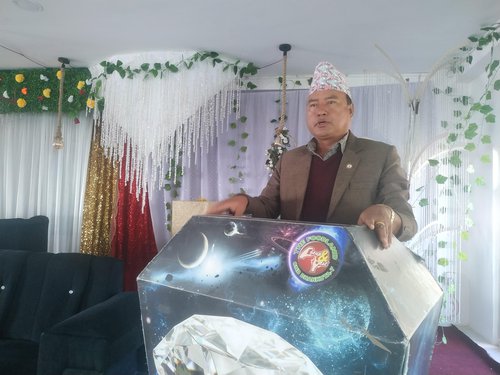
Tamang Mayor Dhankuta Municipality
Established at the District Administrative Office, the MRC now supports the entire municipality of Tehrathum district. "We provide information to new aspiring migrants about their destination countries and the migration process. Similarly, the center offers counseling services to returnee migrants about reintegration schemes. We also assist migrant families in receiving remittances," said Ganga Bardeba, the MRC Focal Point. "As the project has ended, I am now a full-time staff member of the municipality."
Similarly, Bhojpur Municipality has also decided to integrate the MRC into its structure. "The municipality has recruited a staff member to operate the center independently, even after the Samriddhi project support ended," said Khagendra Khadka, the focal person.
"Although the Samriddhi project supported 14 Palikas in six districts to open MRCs, nine local governments have already decided to continue operating the centers as part of local service delivery, bearing the entire financial burden," said Jiban Shrestha, RERP/Samriddhi Project Migration Coordinator.
Labor migration in Nepal is a common phenomenon and a means to achieve a higher living standard. In FY 2022/23 alone, 448,968 Nepali migrant workers received new labor permits to work abroad. This number is understated, as it excludes those traveling to India or without work permits to other countries. One prominent reason for this is the lack of institutions like MRCs at the local level.
The importance of information and knowledge is crucial in the labor migration sector. Recognizing this, the SAMRIDDHI project has established MRCs and MIDs in its project areas to address this need.
"Learning from Samriddhi, the Ministry of Labor, Employment and Social Security can consider adopting the concept of sustainable MRCs integrated with local governments," said Sushil Prasad Acharya, Joint Secretary at the Ministry of Labor, Employment and Social Security.
In an era where sustainability of such centers is a major concern, the RERP has successfully operated 14 MRCs/MIDs in collaboration with local governments. Studies have shown that MRCs play a crucial role in ensuring the safety and productivity of foreign employment in selected local Palikas in Nepal. Unlike other initiatives, the MRCs established by RERP are pioneers in sustainability.
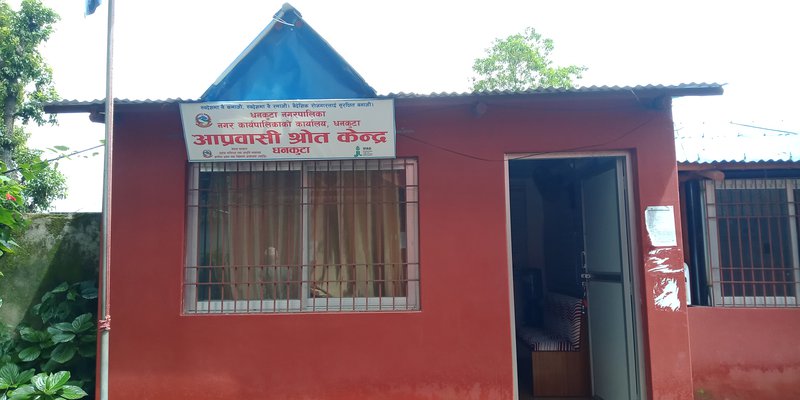
The centers have provided numerous benefits throughout their years of operation. Despite their positive impact on foreign employment, smooth operation has often been challenged by various financial and non-financial issues such as political instability, an unsupportive environment, and changing sector dynamics.
Not only in the hilly regions, but MRCs have also been effectively functioning in Madhesh Province. For example, in Kolhabi Municipality of Bara district, located 200 kilometers south of Kathmandu, the MRC is now a lifeline.
"Mayor Ram Prasad Chaudhary stated that the MRC is solving almost all migration-related problems. The center helps reintegrate returnee migrants and provides information to new aspirants," said Mayor Chaudhary. "Our partnership with Samriddhi has ended, but we have decided to maintain the center as a unit of our municipality. We are very thankful to the Samriddhi Project for leaving us such a useful center."
Established through the Rural Enterprise and Remittance Project Samriddhi in joint collaboration with the municipality, the center has helped rescue individuals from jail, facilitated safe remittance channels, and more.
The MRC also supports returnee migrants in starting ventures with their savings from abroad. “Our MRC has been instrumental in rescue operations, reintegration of returnees, and more. It is a very popular institution in our municipality,” said Mayor Chaudhary.
Mayor Chaudhary emphasized the need for information and counseling centers like the MRC in every municipality and rural municipality to protect those going abroad from encountering difficulties. He highlighted the importance of educating migrants about what to do when seeking foreign employment, how to avoid getting trapped, and what actions to take if problems arise.
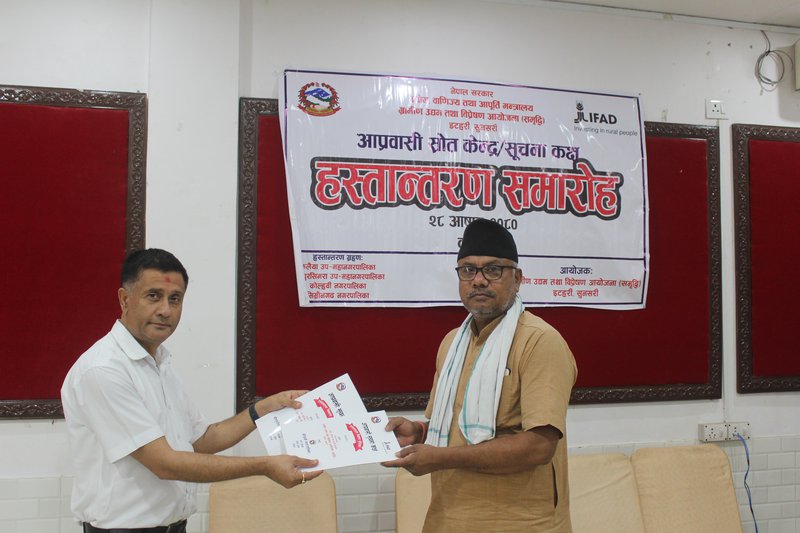
He pointed out the many issues migrants face, such as being cheated, stranded, or encountering various problems in destination countries. He urged local authorities to take initiatives to raise awareness and reduce these problems.
The Deputy Mayor of Diktel Rupakot Majhuwagadhi Municipality believes that having a dedicated cell in every municipality to provide information and assist in rescue operations for migrant workers in distress would greatly benefit those who are stranded, cheated, or suffering abroad.
Umapati Chowdhary, an information assistant at the MRC, reported that last year in Kolhabi Municipality, the center provided counseling and necessary support to 134 people, including 23 women and 111 men.
The MRC offers information on the costs of going abroad, analyzes income and expenses, helps understand the official procedures required abroad, promotes safe migration, and encourages the productive use of remittances by returnees.
RERP-Samriddhi has been working not only to share information and train those going abroad through the establishment of MRCs but also to support returnees in various self-employment activities. Samriddhi is the first project where the Nepal government joined IFAD’s approach to establish sustainable MRCs and MIDs in select municipalities.

Keshab Poudel
Poudel is the editor of New Spotlight Magazine.
- MAHAKUMBH 2025 Festival Of The Century
- Feb 10, 2025
- The Question Arises: Do Former Prime Ministers Prachanda, Nepal, And Dr. Bhattarai Support The Terror actions Of Hamas?
- Dec 11, 2024
- MD KUL MAN GHISING: December 25 Deadline For Upper Tamakoshi
- Dec 09, 2024
- ADB's REFP Reintegration of Returnee Migrants
- Dec 02, 2024
- The Relationship Between Kosovo And Nepal Is Robust: ELBERT KRASNIQUI
- Nov 29, 2024
